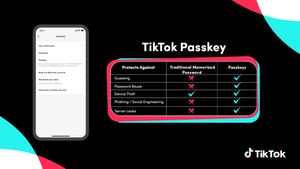JAKARTA - Meta Platform Inc., announced it will release a commercial version of the open-source Llama artificial intelligence model, which provides powerful and free alternatives for start-ups and other businesses, compared to the expensive exclusive models from OpenAI and Google.
The latest version of the model, called Llama 2, will be distributed by Microsoft via its Azure cloud service and will run on the Windows operating system, Meta announced in a post on the blog, referring to Microsoft as a "mitra of our choice" for this launch.
The Llama model, previously Meta only provides selected academics for research purposes, will also be available through live downloads and through Amazon Web Services, Hugging Face, and other providers, according to blog posts and separate posts by Meta CEO Mark Zuckerberg.
"Open source encourages innovation as it allows more developers to build with new technologies," Zuckerberg wrote. "I believe this will open up more progress if the ecosystem is more open."
Presenting a broad and free Llama secomplex model for use by businesses has the potential to disrupt the initial dominance that has been built in a growing market for AI-generative software by players like OpenAI, backed by Microsoft and its models have been offered to business customers via Azure.
"The first lease has competed with models that drive OpenAI's ChatGPT and Google's Bard chatbot, while the new Llama has been trained with 40% more data than its predecessor, with more than 1 million annotations by humans to improve its output quality," Zuckerberg said.
"Commercial Llama can change the situation," said Amjad Masad, CEO of the Replit software development platform, which says more than 80% of projects there use OpenAI models.
"Incremental increase in open-source models will affect the market share of models that are not open-sourced because you can run them at low cost and have less dependence," Masad said.
The announcement follows plans from Microsoft's biggest rivals, Alphabet's Google and Amazon, to provide business customers with various AI models to choose from.
For example, Amazon markets access to Claude - AI from the famous startup Anthropic - apart from their own Titan model family. Google, as well, has said it plans to make Claude and other models available to its cloud customers.
اقرأ أيضا:
Previously, Microsoft had focused on creating technology available from OpenAI in Azure.
Asked why Microsoft would support offerings that might lower OpenAI's value, a Microsoft spokesperson said giving developers a choice in the type of model they use would help expand its position as a cloud platform of choice for AI work.
By releasing Llama to the public, it also means risking, as this can increase the convenience for irresponsible actors to build products without paying attention to security controls.
In April, researchers at Stanford disabled the chatbot they had built at a cost of 600 US dollars (Rp8.9 million) using the first version of the Llama model after producing unpleasant text.
Meta executives say they believe the release of technology public is actually reducing security risks by leveraging the wisdom of many people to identify problems and build resilience into the system.
The company also said it had established an "acceptable use" policy for commercial Llama that prohibits "certain use cases," including violence, terrorism, exploitation of children, and other criminal activities.
The English, Chinese, Japanese, Arabic, and French versions are automatically generated by the AI. So there may still be inaccuracies in translating, please always see Indonesian as our main language. (system supported by DigitalSiber.id)


















